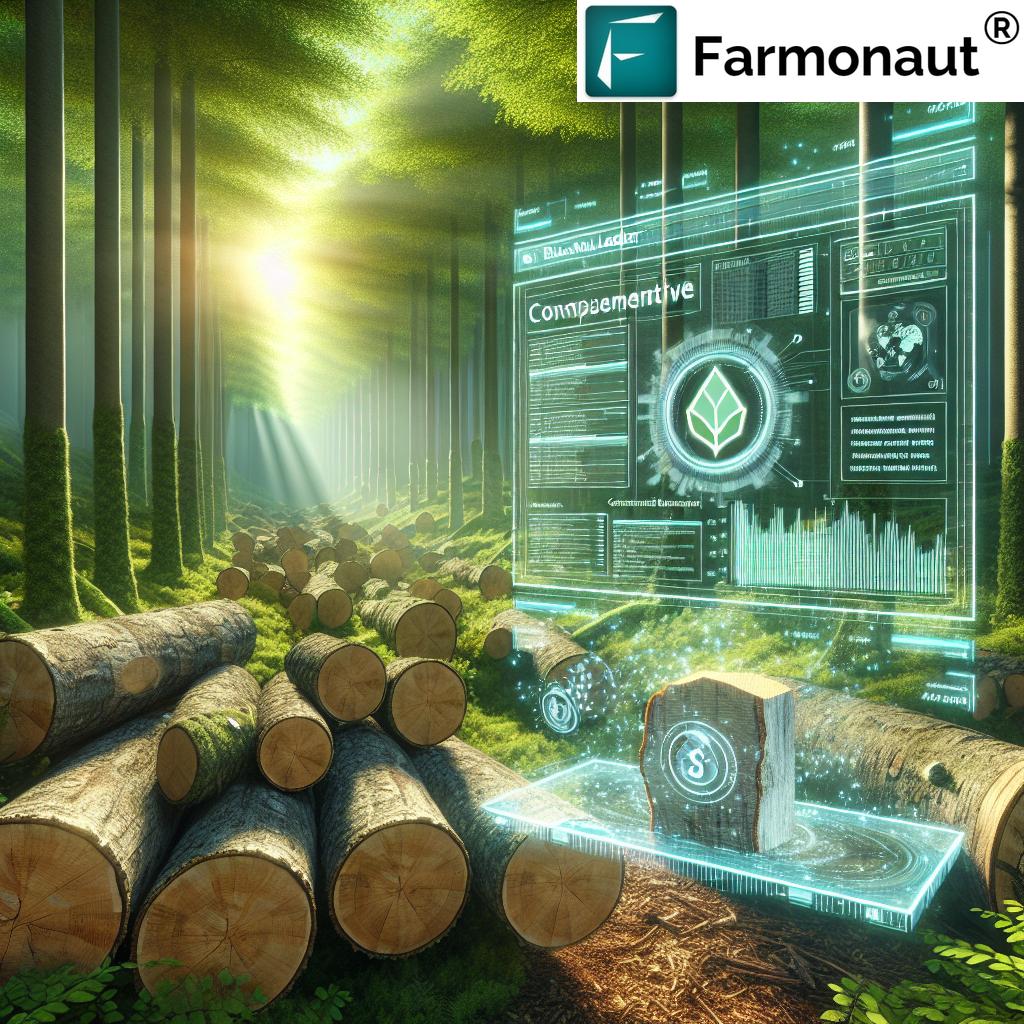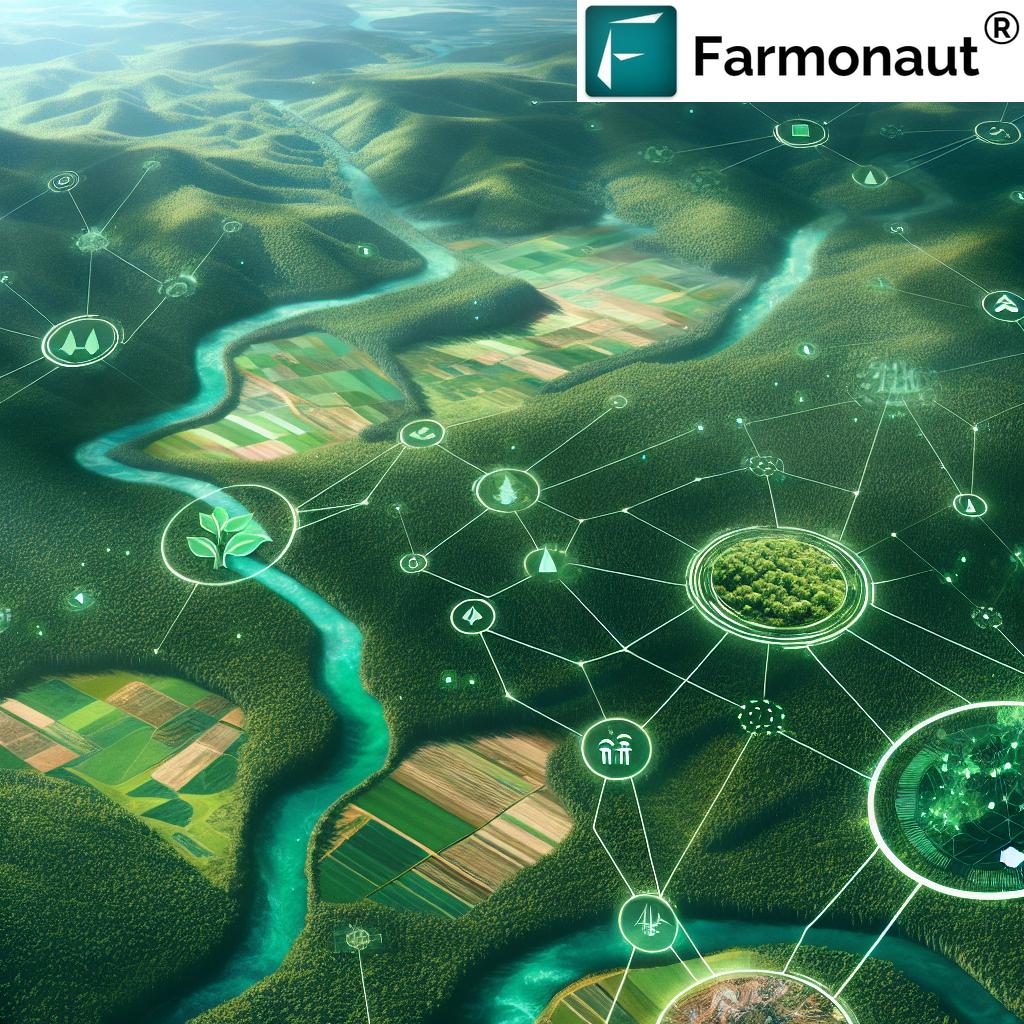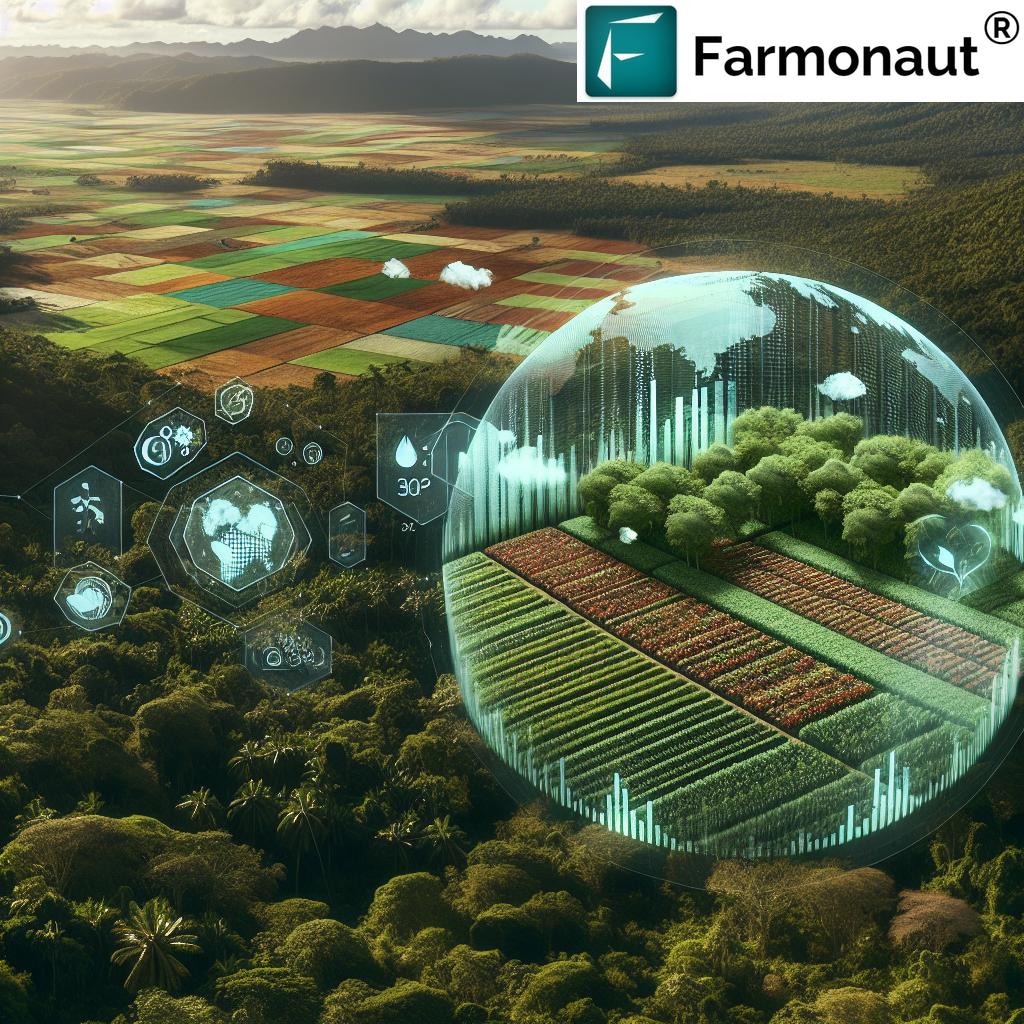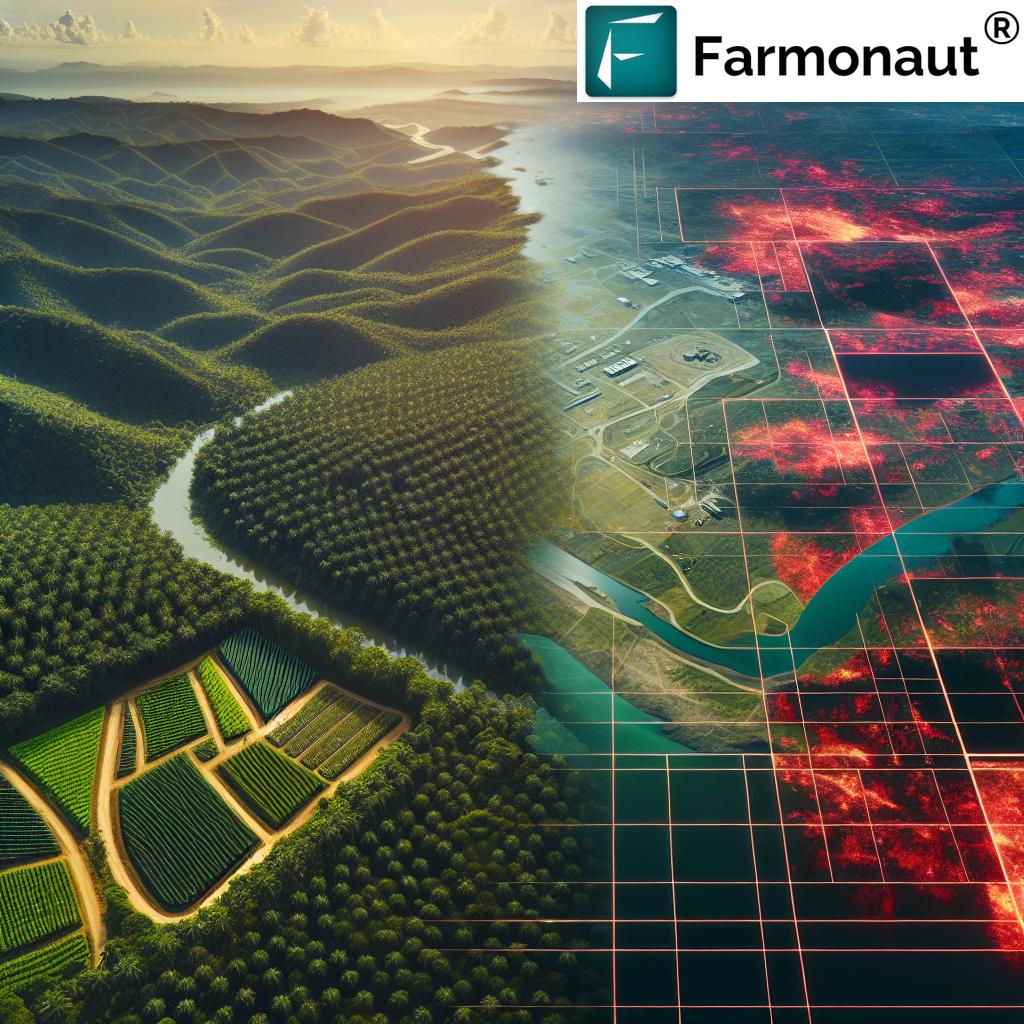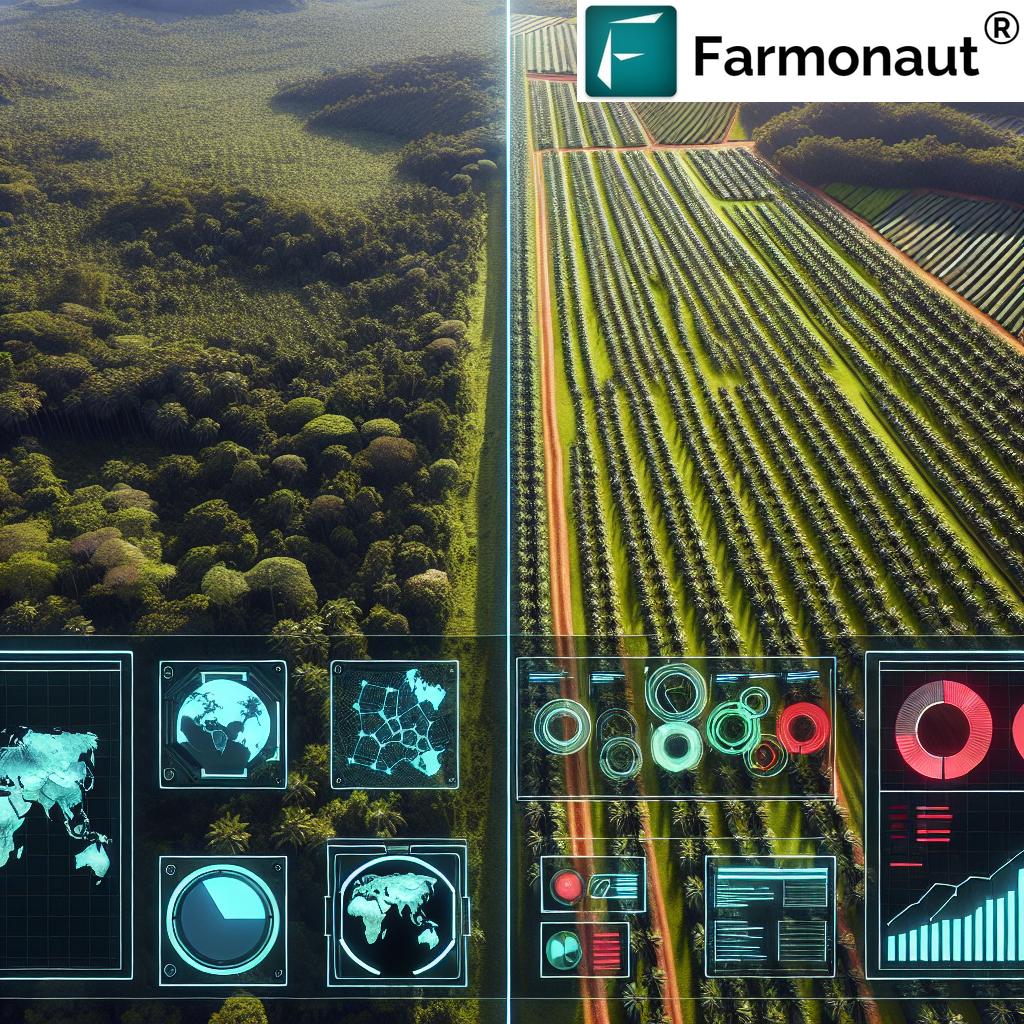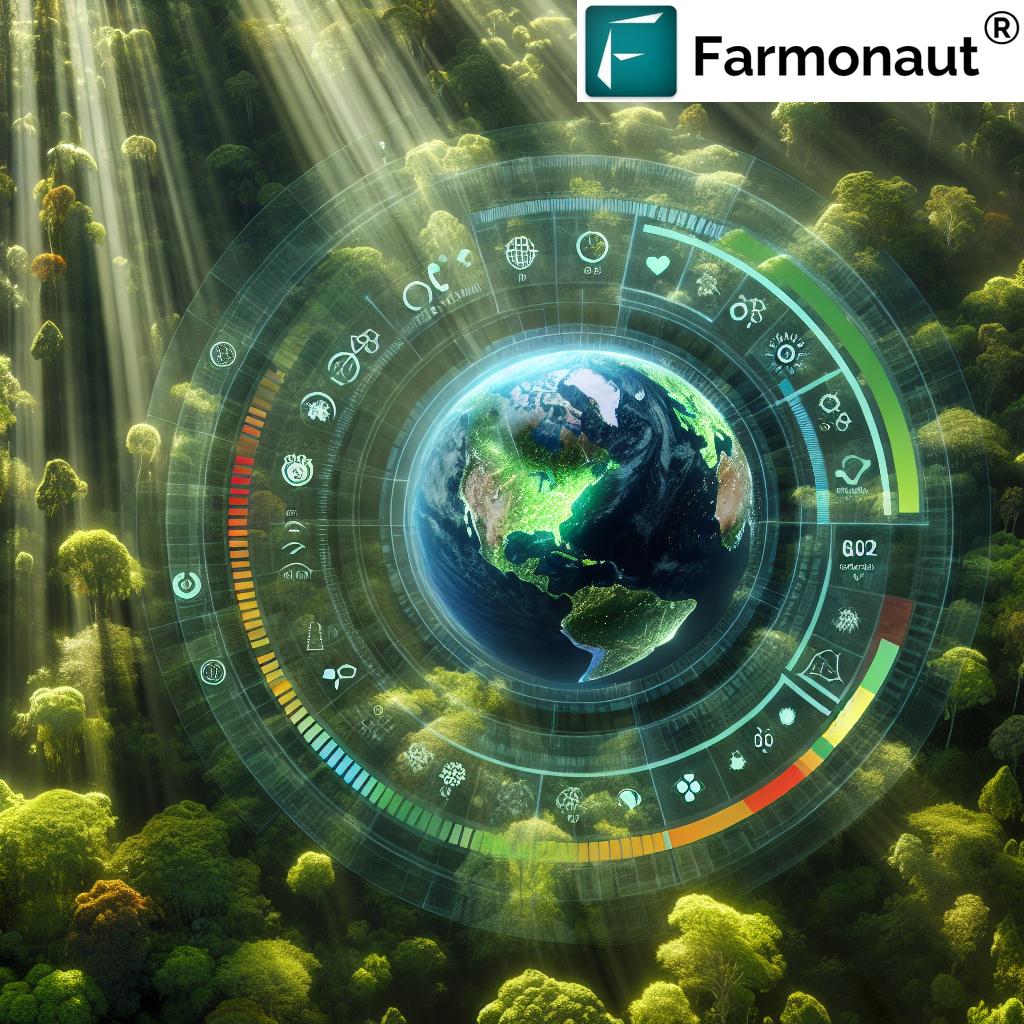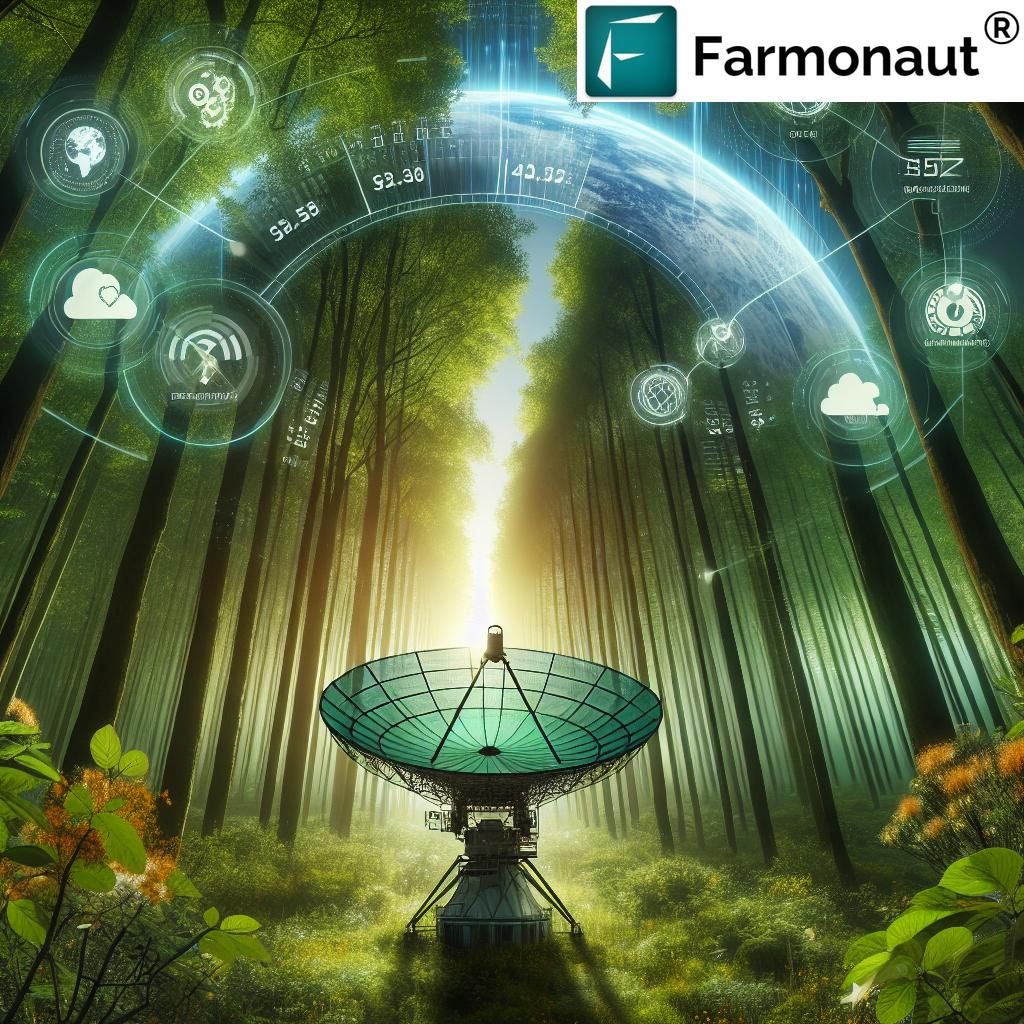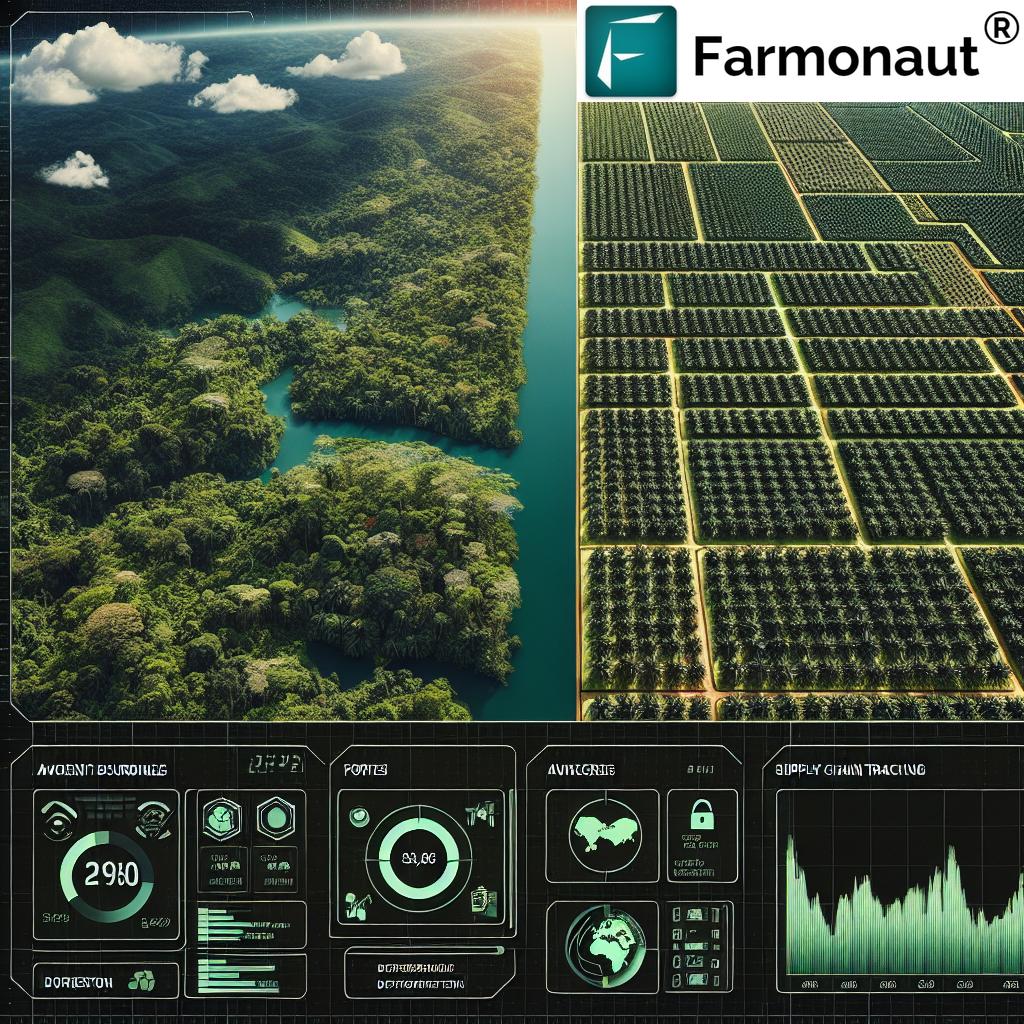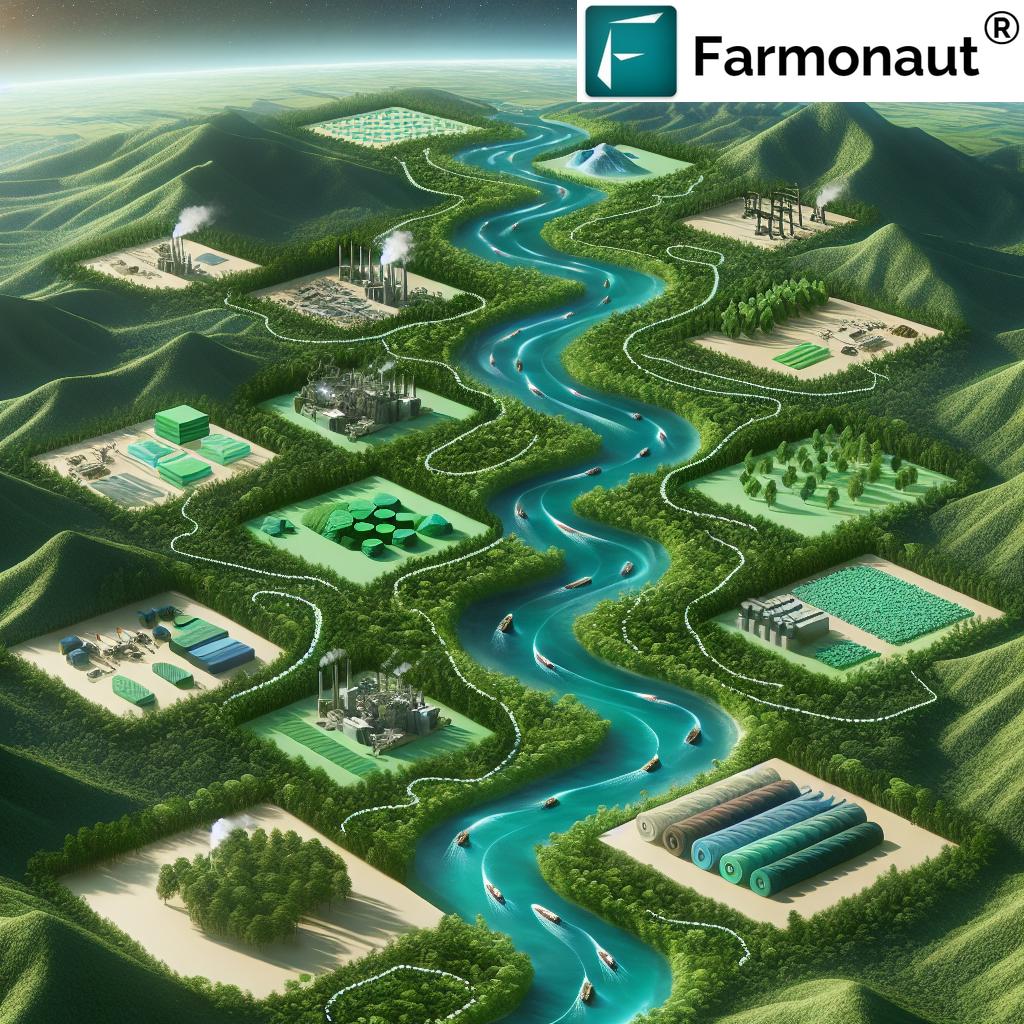EU Deforestation Regulation 2025: How Farmonaut’s Satellite Technology Ensures Sustainable Agricultural Supply Chains
“The EU Deforestation Regulation, effective 2025, will impact 75% of global soy exports and 40% of beef exports.”
As we approach the dawn of a new era in sustainable agriculture and environmental protection, the European Union (EU) is taking bold steps to combat global deforestation through its groundbreaking EU Deforestation Regulation (EUDR). Set to come into effect in 2025, this regulation is poised to transform the landscape of agricultural commodity monitoring and sustainable farming practices worldwide. At Farmonaut, we recognize the urgent need for innovative solutions to meet these new regulatory challenges while ensuring the continued prosperity of the agricultural sector.
In this comprehensive blog post, we will explore the implications of the EUDR, discuss cutting-edge agtech solutions for sustainability, and examine the crucial role of satellite monitoring in ensuring compliance. We’ll delve into how Farmonaut’s precision agriculture technology is at the forefront of this green revolution, offering powerful tools for sustainable farming techniques and environmental impact assessment.
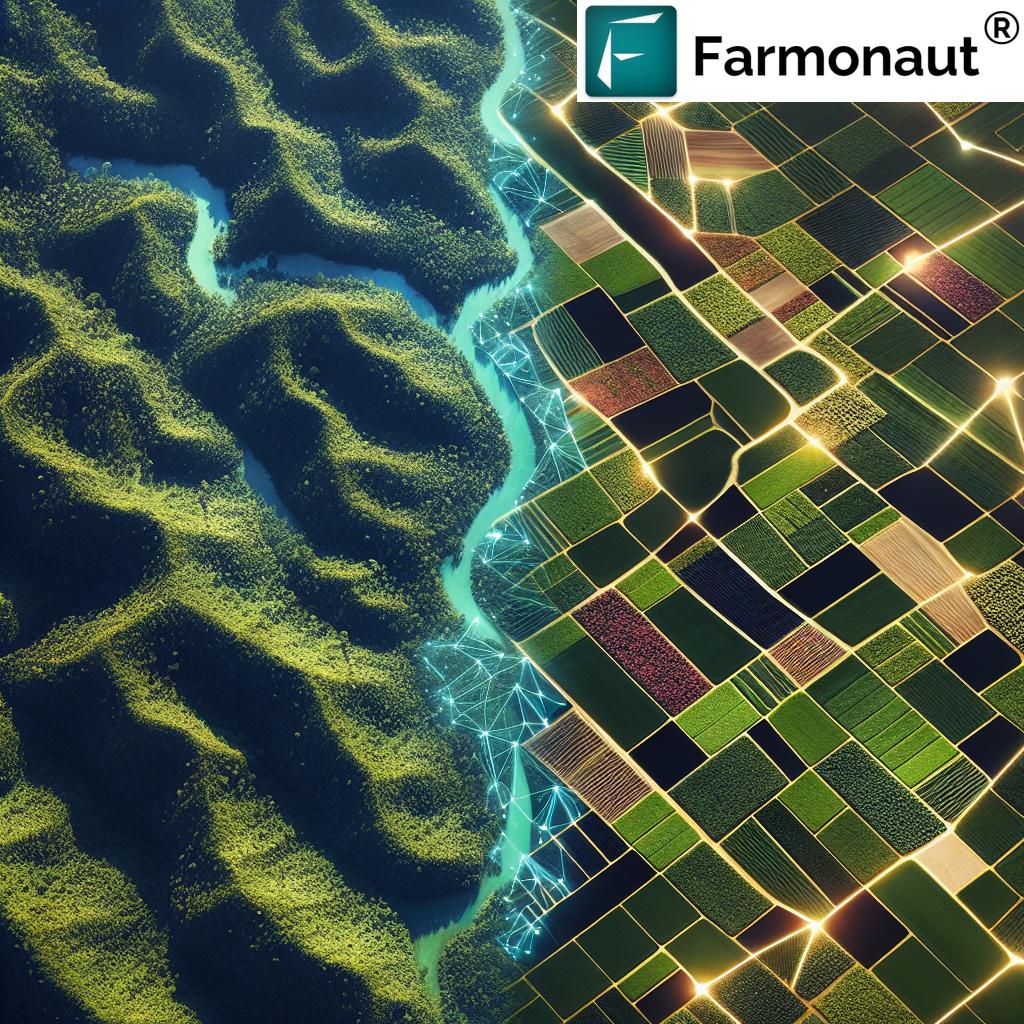
Understanding the EU Deforestation Regulation
The EUDR is a landmark piece of legislation aimed at curbing deforestation and forest degradation driven by EU consumption and production. It sets stringent requirements for companies importing or exporting specific agricultural commodities and derived products to ensure they are not linked to deforestation or forest degradation.
- Key Commodities Affected: The regulation covers cattle, cocoa, coffee, palm oil, soy, and wood.
- Supply Chain Traceability: Companies must implement robust due diligence systems to trace their products back to the point of production.
- Deforestation-Free Requirement: Products must be certified as “deforestation-free” to enter or leave the EU market.
- Compliance Deadline: Companies have until 2025 to ensure full compliance with the regulation.
The EUDR represents a significant shift in global trade practices, putting sustainability and environmental protection at the forefront of agricultural supply chains. For businesses operating in the EU or exporting to the region, adapting to these new requirements is not just a legal obligation but a crucial step towards ensuring long-term viability in an increasingly eco-conscious market.
The Challenge for Agricultural Supply Chains
The implementation of the EUDR presents several challenges for businesses across the agricultural supply chain:
- Traceability: Establishing and maintaining complete traceability from farm to shelf.
- Data Collection: Gathering and verifying accurate data on land use and production practices.
- Smallholder Inclusion: Ensuring compliance without excluding small-scale farmers from global supply chains.
- Cost Management: Implementing new systems and technologies while maintaining competitiveness.
- Cross-Border Coordination: Aligning practices across different countries and regulatory environments.
These challenges underscore the need for innovative, technology-driven solutions that can provide comprehensive monitoring, data analysis, and supply chain management capabilities.
Farmonaut’s Role in EUDR Compliance
At Farmonaut, we are uniquely positioned to help businesses navigate the complexities of EUDR compliance through our advanced satellite-based farm management solutions. Our platform integrates cutting-edge technologies to address the key challenges posed by the regulation:
- Satellite Crop Monitoring: Real-time tracking of land use and crop health to prevent deforestation.
- GIS Mapping: Precise geographical information for accurate land use documentation.
- AI-Powered Analytics: Advanced data analysis for early detection of potential compliance issues.
- Blockchain-Based Traceability: Secure and transparent supply chain documentation from farm to consumer.
By leveraging these technologies, we empower agribusinesses to meet EUDR requirements while optimizing their farm management practices and contributing to global efforts in combating deforestation.
Satellite Technology: The Key to Sustainable Agriculture
“Satellite technology can detect deforestation with 90% accuracy, monitoring over 500 million hectares of forest annually.”
Satellite technology stands at the forefront of our fight against deforestation and unsustainable agricultural practices. At Farmonaut, we harness the power of remote sensing and GIS to provide unparalleled insights into land use, crop health, and environmental impact.
- Precision Monitoring: Our satellite imagery can detect changes in forest cover and agricultural land use with remarkable accuracy.
- Vast Coverage: We can monitor millions of hectares simultaneously, providing a comprehensive view of agricultural activities.
- Temporal Analysis: Regular satellite passes allow for time-series analysis, tracking changes over months and years.
- Data Integration: We combine satellite data with ground-level information for a holistic understanding of agricultural practices.
This technology not only aids in EUDR compliance but also promotes sustainable farming techniques by providing farmers with actionable insights for better resource management and crop yield optimization.
Implementing Sustainable Farming Techniques
Sustainable agriculture is at the heart of EUDR compliance and global efforts to combat climate change. Farmonaut’s precision agriculture technology enables farmers to adopt and refine sustainable farming techniques:
- Optimized Resource Use: Our satellite data helps farmers apply water, fertilizers, and pesticides more efficiently, reducing waste and environmental impact.
- Crop Rotation Planning: AI-driven insights assist in planning optimal crop rotations to maintain soil health and biodiversity.
- Precision Planting: Detailed soil and topography data guide precise planting decisions, maximizing yield while minimizing land use.
- Early Pest and Disease Detection: Remote sensing technology allows for early identification of crop health issues, reducing the need for broad-spectrum pesticides.
By embracing these techniques, farmers can not only comply with EUDR requirements but also improve their productivity and profitability while reducing their environmental footprint.
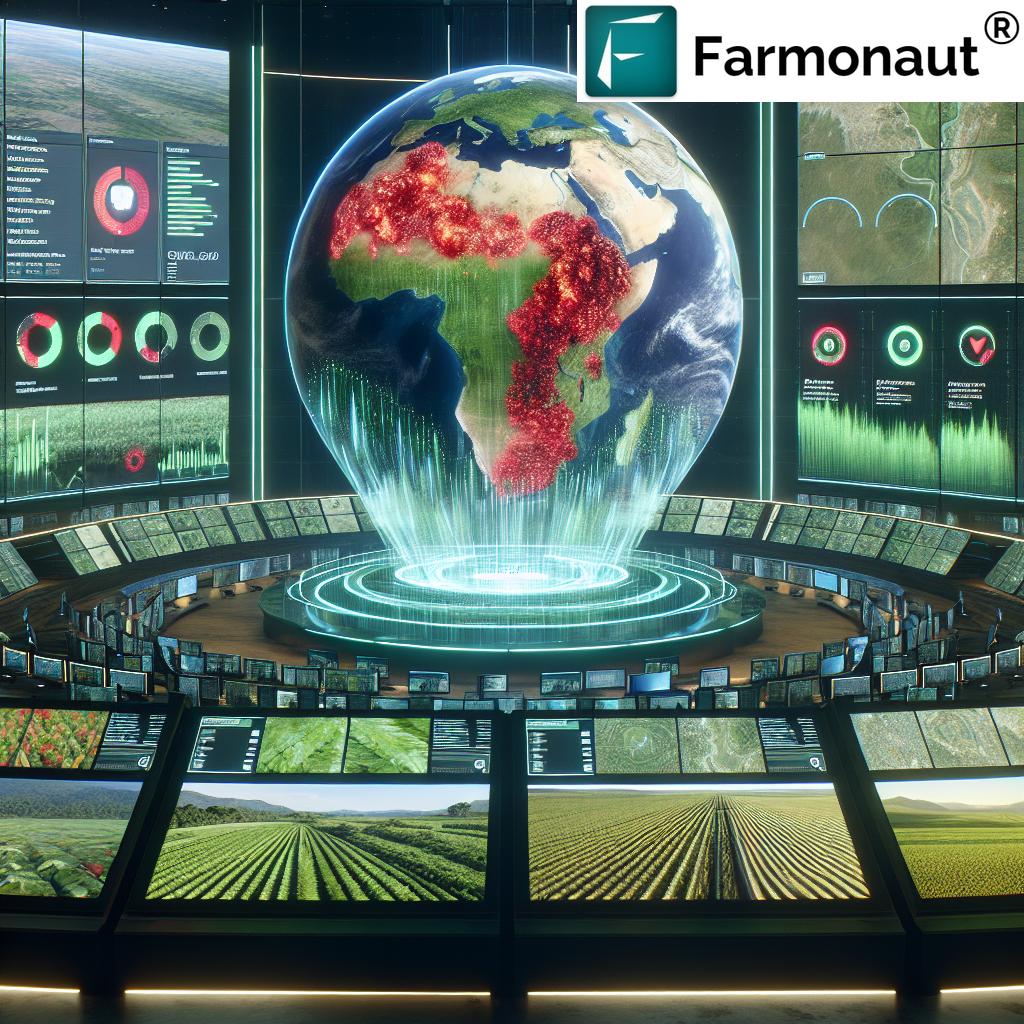
Environmental Impact Assessment with Farmonaut
Understanding and mitigating the environmental impact of agricultural activities is crucial for EUDR compliance. Farmonaut’s platform offers comprehensive tools for environmental impact assessment:
- Carbon Footprint Tracking: Monitor and analyze greenhouse gas emissions associated with farming practices.
- Biodiversity Mapping: Identify and protect areas of high biodiversity value within agricultural landscapes.
- Soil Health Monitoring: Track soil quality indicators to prevent degradation and promote sustainable land use.
- Water Resource Management: Analyze water usage patterns and implement conservation strategies.
These assessments provide valuable data for regulatory compliance and help businesses make informed decisions to reduce their environmental impact while maintaining productivity.
The Forest 500: A Call to Action
The Forest 500 initiative, which assesses the most influential companies and financial institutions in forest-risk supply chains, has highlighted a critical issue: many companies are unprepared for the upcoming EUDR regulations. This underscores the urgent need for immediate action in adopting sustainable practices and implementing robust monitoring systems.
Key findings from the Forest 500 report include:
- Only a small percentage of companies have comprehensive no-deforestation policies across all commodities.
- Many businesses lack transparent reporting on their forest-related risks and mitigation strategies.
- There’s a significant gap in traceability systems, particularly for complex supply chains.
These findings emphasize the importance of partnering with technology providers like Farmonaut to rapidly develop and implement the necessary systems for EUDR compliance.
Agtech Solutions for Sustainability
The agricultural technology (agtech) sector is rapidly evolving to meet the challenges posed by regulations like the EUDR. Farmonaut is at the forefront of this revolution, offering a suite of innovative solutions:
- AI-Powered Crop Monitoring: Our advanced algorithms analyze satellite imagery to detect changes in land use and crop health, providing early warnings of potential deforestation or unsustainable practices.
- Blockchain for Supply Chain Transparency: We implement blockchain technology to create an immutable record of agricultural products from farm to consumer, ensuring traceability and preventing fraud.
- IoT Integration: Our platform can integrate with IoT devices on farms to collect real-time data on soil conditions, weather, and crop growth, enabling precise resource management.
- Machine Learning for Yield Prediction: By analyzing historical data and current conditions, our AI models can predict crop yields with high accuracy, helping farmers make informed decisions about planting and harvesting.
These agtech solutions not only facilitate EUDR compliance but also drive overall efficiency and sustainability in agricultural operations.
Global Impact of EUDR
While the EUDR is an EU regulation, its impact will be felt globally due to the interconnected nature of agricultural supply chains. Countries and regions around the world are taking notice:
- United States: Many US exporters are adapting their practices to meet EU standards, potentially influencing domestic policies.
- UK: Post-Brexit, the UK is developing its own regulations aligned with EUDR principles.
- Tropical Regions: Major producers of commodities like palm oil, cocoa, and coffee are implementing new monitoring and certification systems.
- Indigenous Communities: The regulation emphasizes the protection of indigenous land rights, potentially strengthening global indigenous advocacy.
This global shift towards sustainable agriculture and deforestation-free supply chains presents both challenges and opportunities for businesses worldwide.
Farmonaut’s Commitment to Sustainable Agriculture
At Farmonaut, we are dedicated to supporting the global transition to sustainable agriculture. Our commitment extends beyond mere compliance with regulations like the EUDR; we aim to transform agricultural practices for the better. Here’s how we’re making a difference:
- Continuous Innovation: We invest heavily in R&D to stay at the cutting edge of agtech, constantly improving our satellite monitoring and data analysis capabilities.
- Farmer Education: We provide resources and training to help farmers understand and implement sustainable practices using our technology.
- Collaboration with Research Institutions: We partner with leading agricultural research centers to validate and enhance our methodologies.
- Adaptive Solutions: Our platform is designed to evolve with changing regulations and environmental conditions, ensuring long-term relevance and effectiveness.
By choosing Farmonaut, businesses not only gain a powerful tool for EUDR compliance but also become part of a larger movement towards a more sustainable and responsible agricultural sector.
EUDR Compliance Readiness Comparison
| Agricultural Sector | Estimated Compliance Readiness (%) | Key Challenges | Farmonaut Solutions |
|---|---|---|---|
| Palm Oil | 65% | Traceability in smallholder supply chains | Satellite monitoring, blockchain traceability |
| Soy | 50% | Large-scale land use changes | GIS mapping, deforestation alerts |
| Cocoa | 40% | Smallholder engagement, forest encroachment | Precision agriculture tools, AI advisory |
| Coffee | 55% | Climate change adaptation, shade-grown verification | Crop health monitoring, vegetation index analysis |
| Beef | 35% | Indirect suppliers, pasture expansion | Satellite-based grazing management, supply chain mapping |
The Road Ahead: Preparing for 2025 and Beyond
As the 2025 EUDR compliance deadline approaches, businesses must act swiftly to adapt their operations. Here are key steps to prepare:
- Assess Current Practices: Conduct a thorough review of your supply chain to identify potential areas of non-compliance.
- Invest in Technology: Implement robust monitoring and traceability systems like those offered by Farmonaut.
- Engage Suppliers: Work closely with your suppliers to ensure they understand and can meet EUDR requirements.
- Develop Internal Expertise: Train your team on sustainable practices and compliance procedures.
- Plan for Continuous Improvement: Set up systems for ongoing monitoring and adaptation to evolving regulations and best practices.
By taking these steps and leveraging Farmonaut’s advanced technologies, businesses can not only achieve compliance but also position themselves as leaders in sustainable agriculture.
Conclusion: Embracing a Sustainable Future
The EU Deforestation Regulation represents a significant step towards a more sustainable and responsible global agricultural sector. While the challenges are substantial, they also present an opportunity for innovation and positive change. By embracing advanced technologies like those offered by Farmonaut, businesses can not only comply with new regulations but also contribute to the vital goal of protecting our planet’s forests and ecosystems.
Our satellite-based monitoring, precision agriculture tools, and blockchain traceability solutions provide the comprehensive support needed to navigate this new regulatory landscape. As we move towards 2025 and beyond, Farmonaut remains committed to empowering farmers, agribusinesses, and policymakers with the data and insights needed to make informed, sustainable decisions.
The journey towards fully sustainable and deforestation-free agricultural supply chains is complex, but with the right tools and commitment, it is achievable. Together, we can create a future where agricultural productivity and environmental protection go hand in hand, ensuring food security and ecological balance for generations to come.
To learn more about how Farmonaut can support your journey towards EUDR compliance and sustainable agriculture, explore our platform and services today.
Access our powerful tools:
For developers: Integrate our powerful API into your systems. Check out our API Developer Docs for more information.
Frequently Asked Questions (FAQ)
- What is the EU Deforestation Regulation (EUDR)?
The EUDR is a regulation set to come into effect in 2025, aimed at preventing the import of products linked to deforestation into the EU market. - How can Farmonaut help with EUDR compliance?
Farmonaut offers satellite-based monitoring, GIS mapping, and blockchain traceability solutions that help businesses track and verify their agricultural supply chains for EUDR compliance. - What agricultural commodities are affected by the EUDR?
The EUDR primarily affects cattle, cocoa, coffee, palm oil, soy, and wood products. - How accurate is satellite technology in detecting deforestation?
Modern satellite technology can detect deforestation with up to 90% accuracy, monitoring vast areas of forest simultaneously. - Can Farmonaut’s solutions be used globally?
Yes, Farmonaut’s satellite-based solutions can be applied to agricultural operations worldwide, regardless of location.





